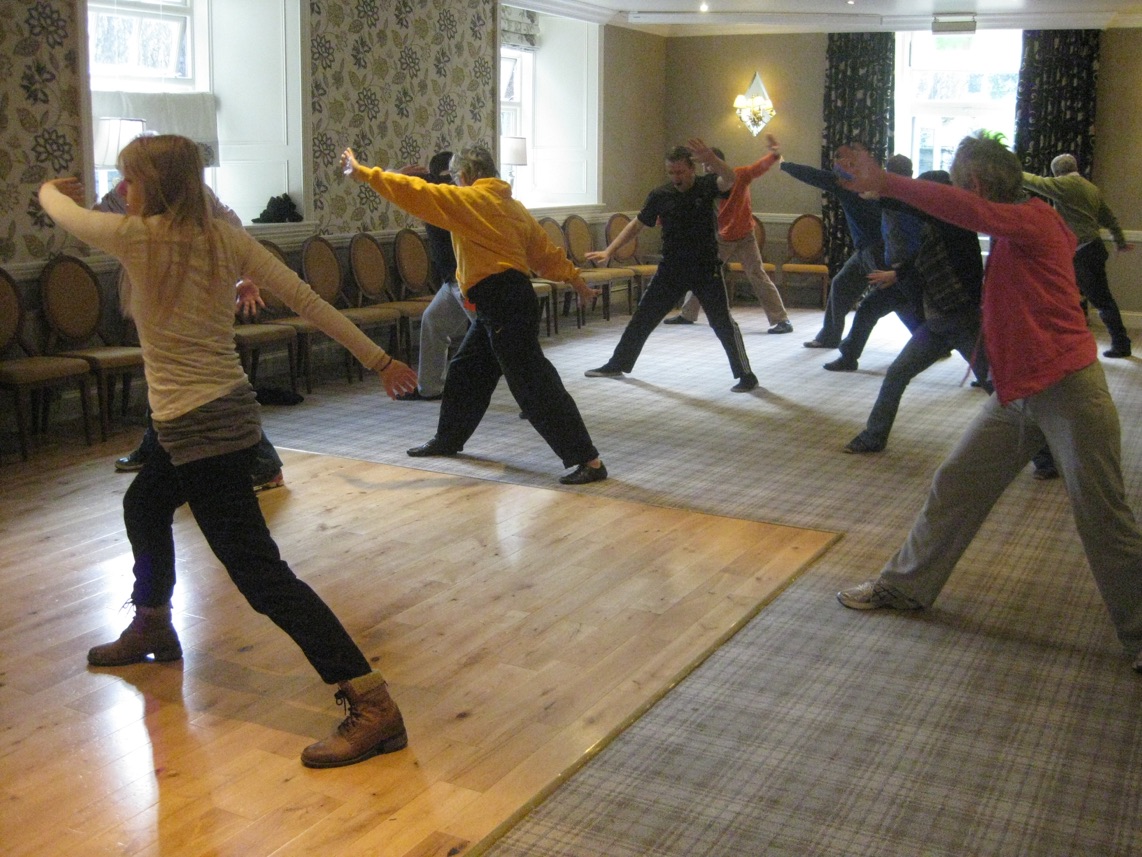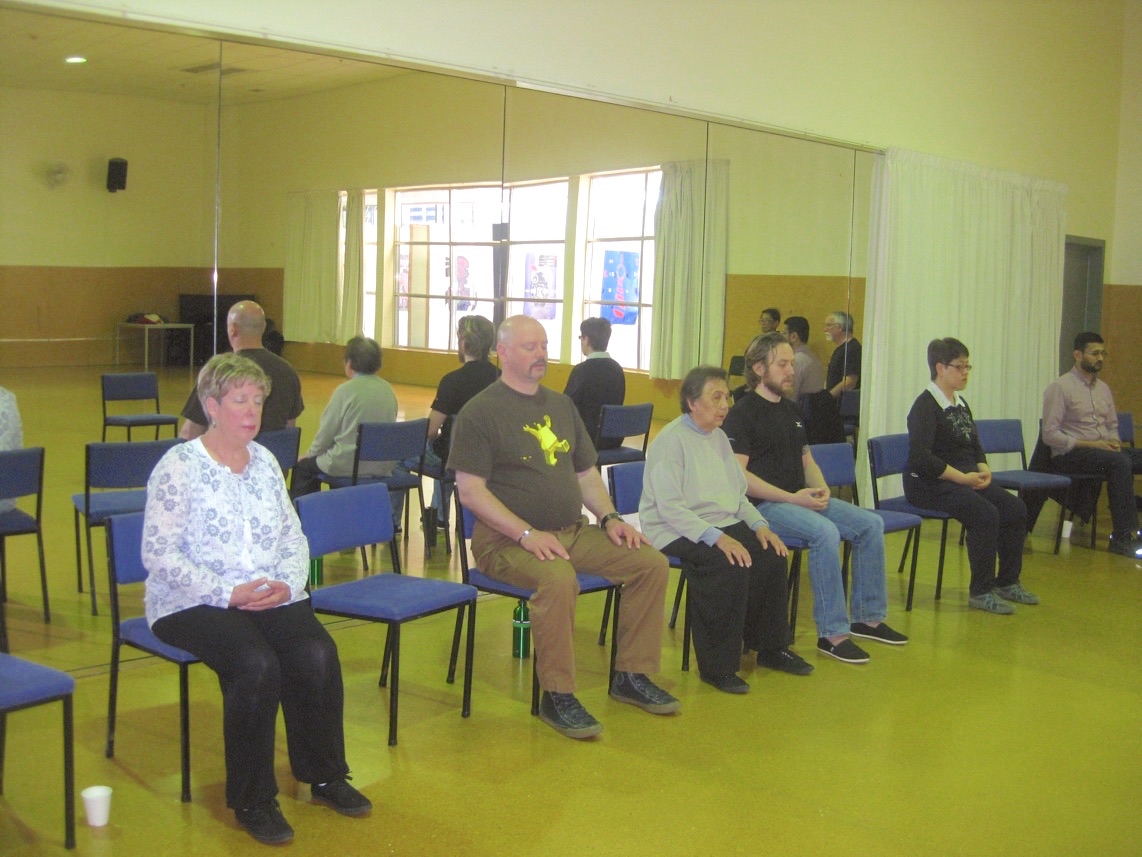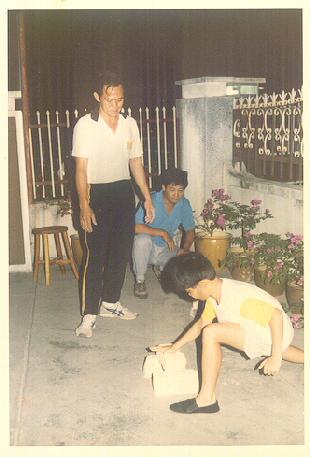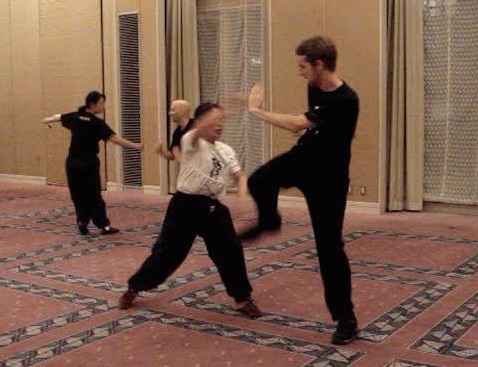SELECTION OF QUESTIONS AND ANSWERS
DECEMBER 2016 PART 3

Many people may find it hard to believe, but practicing genuine chi kung can overcome any illness!
Question 1
After recovering from an illness by practicing chi kung, can he stop practicing when the illness has been overcome? Will the illness relapse if he does not continue his chi kung practice.
— Alex, USA
Answer
Yes, he can stop practicing chi kung after he has recovered from his illness. His illness will not relapse after it has been overcome.
If it relapses, it means he has not recovered completely. The agent that causes his illness remains domain, and surfaces again when he stops his chi kung practice. Hence, to make sure he has completely recover, he should continue practicing his chi kung for some time, like a month, even when the symptoms of his illness have disappeared.
But stopping his chi kung practice when he has recovered from an illness is not recommended. What is recommended is for him to continue practicing his chi kung and enjoying his practice, irrespective of whether he is ill or healthy.
In other words, if he is sick, he practices his chi kung and enjoys his practice. He does not even think of when or how his chi kung practice will overcome his illness. He just enjoys his practice. On the other hand, if he is healthy, he just practices his chi kung and enjoys it. He does not intellectualise how his chi kung practice prevents him from being sick. He just enjoys his practice, without even thinking of the benefits the practice will bring him.
This is the advice given by chi kung masters past and present. Just enjoy the chi kung practice. Don’t even think of the benefits. The benefits will surly come.
Question 2
My friend suffered from cancer. of the gall bladder. He recovered from the gall bladder cancer after practicing chi kung learnt from you. When he went for his medical check up, his specialist doctor was very surprised. The doctor said there were still some cells in his gall bladder that might become cancerous, and suggested preventive surgery to cut off some part of the gall bladder as a pre-emptive measure. My friend was undecided. What is your opponent?
Answer
My opinion is that he should continue practicing his chi kung not just as a preventive messier but for his enjoyment, instead of going for preventive surgery. I would like to emphasise that this is my opinion. Your friend has to make his decision.
Simple reasoning, if your friend is not too emotional that he cannot reason, shows that my opinion is better. He had cancer — not that he might have cancer. By practicing chi kung learned from me he recovered from his cancer, which actually is not a surprise to me and many people in our school, though it may be a surprise to his specialist doctor and many other people.
Now there is a possibility that he may have cancer again. In fact every one has this possibility, including you and the specialist doctor. But it is not a big deal. If his cancer occurs again, just practice the chi kung learnt from me, and again overcome his cancer. Or to be doubly sure, he can learn from me again or from any of our certified instructor.
Better still, he can continue to practice his chi kung not only as a preventive measure but to have good health, vitality and longevity.

Meditation seated upright on a chair
Question 3
Can we develop psychic posers by practicing chi kung? What special methods we can use to develop psychic powers?
— Colin, New Zealand
Answer
Yes, we can develop psychic powers by practicing high-level chi kung. Many of our instructors and some of our students have psychic powers. They can, for example, tell what will happen in the near future, or see through time and space.
Exercises that train the mind or spirit are excellent for developing psychic powers. In our school this means all chi kung and kungfu exercises, as all our kungfu and chi kung train the mind or spirit. But certain exercises, like Golden Bridge, One-Finger Shooting Zen, Cosmic Breathing, Sinew Metamorphosis and Small Universe are particularly effective.
We must remember that ours is basically chi kung and kungfu school, not a school for mind training or spiritual cultivation, though our mind and spiritual attainments are remarkable. Hence, developing psychic powers is a bonus, not an aim. In other words, if a student in our school does not develop any psychic powers, we are not concerned. If he is sickly and weak, or cannot use his kungfu techniques for self-defence, we are concerned because having good health is an aim, not a bonus, of our chi kung practice, and being combat efficient is an aim of our kungfu training.
It is helpful to point our that different people and different cultures may have different perceptions of psychic powers. For convenience, we may classify their perceptions into three categories. Some people, like some Westerners, regard psychic powers as were. They do not want to be associated with these powers. Some, like Theravada monks, regard psychic powers as a distraction, distracting them in their effort to attain Enlightenment. Others, like yogis and Mahayana monks, regard them as useful to help other people.
The stand of our school on psychic powers is that we are happy to have them but we will not crave for them. If we have psychic powers, we will use them for good, and never for evil. apart from being righteous, which is a cherished value in our school, we are fully aware of the universal law of karma, that goodness will bring goodness, and evilness will bring evilness. It is just silly for someone with psychic powers to abuse them.
Question 4
What is the difference between seated on a chair and in a lotus position when practicing sitting mediation?
— Janet New Zealand
Answer
There are four modes of meditation, namely standing, sitting, moving and lying down. If all other things were equal, sitting mediation produces deep results but the results come slowly. Standing meditation brings results fast, but the results are not as deep. Moving meditation, like performing Taijiquan, stimulates energy flow. Lying down meditation is for those who are too weak or too sick to perform the other three modes of meditation.
But in reality other things are not equal. In our school we have become so skilful in meditation that our students often have better results in a short time performing standing meditation that many other people performing sitting meditation for a long time. It is ridiculous but true that many of our students attain spiritual expansion beyond their physical body in a course like Cosmic Breathing or Expanding into the Cosmos of a few hours, while only very few dedicated monks in a monastery take many years.
Sitting meditation refers to sitting in a lotus or a semi-lotus position. Sitting upright on a seat is an innovation for those who have difficulty sitting in a lotus or semi-lotus position but wish to practice sitting meditation. The results aimed at in sitting meditation on a seat are not as deep as those in sitting meditation in a lotus position, and are usually attaining relaxation and mental clarity.
To answer the question directly, practicing meditation seated upright on a seat is much easier than sitting meditation in a lotus position. Almost anyone can practice meditation seated upright on a seat. Those who want to practice sitting meditation in a lotus position may have to first practice exercises to loosen their leg muscles. I myself took two years to practice leg stretching exercises every night before I could sit in a lotus position.
The result is also different. For most people, the result of meditation sitting on a seat is to be relaxed. Because of their other skills, students in our school are able to attain high levels of mental clarity. The result of sitting meditation in a lotus position is spiritual cultivation, including high-level attainments like expanding into the Cosmos, though many meditation may not realize, theoretically and experientially, these noble aims. Nevertheless, many of our students can attain these noble aims like expanding into the Cosmos by performing standing meditation.

An old picture showing Sifu Wong Chun Nga employing internal force to break a brick when he was only eleven
Question 5
I always look forward to reading the questions posed to Grandmaster Wong and his responses. But I haven't seen any postings since September. Is everything OK ? Has this feature of the website been cancelled ?
Also, I would like to thank the Grandmaster for coming to New York this past April and look forward to future visits.
— Bruce ,USA
Answer
The Question-Answer Series continues as usual, and many people, like you, have kindly mentioned that they have enjoyed and benefited from it.
It is likely that you view an old issue of the Question-Answer Series which has been kept in your computer. You can view the latest issue, and subsequently all the issues you have missed, by refreshin g your computer. This can be done by simultaneously pressing the "commend" button and the "R" button.
The New York courses were excellent. I look froward to visiting New York again. As I have many countries to visit, I usually hold courses in a country once in two years.
Question 6
You school places a lot of importance on internal force? Does everyone in your school has internal force?
— Gerald, France
Answer
We place a lot of importance on internal force in our practice because it brings us a lot of benefits. Not only internal force greatly enhances our combat efficiency, more importantly it gives us good health, vitality, longevity, mental clarity and spiritual joys.
Presuming all other things were equal, if two persons are sick, the one with internal force will recover faster. It two healthy persons perform a same job, the one with internal force will have better result.
Yes, every student in our school, including those who only practice chi kung but not kungfu, has internal force. This is because internal force training is incorporated in all our training.
When a student in our school performs a chi kung exercise, he generates a chi flow. When the chi flow increases in volume, it constitutes internal force, even when he does not perform any specific internal force training method.
When a student in our school performs a kungfu movement, he also generates a chi flow. When this chi flow increases in volume, it constitutes internal force, even when he does not perform any specific internal force training method.
To many people, including martial artists, this is extra-ordinary. Many people think that internal force can only be developed using internal force training methods. These methods will increase the amount of internal force, but internal force can also be developed using chi kung and kungfu movements that are normally considered external.
For example, if you perform “Pushing Mountain” as a gentle physical exercise, you will not be able to develop any internal force. This is what most people do.
But if you use the same “Pushing Mountain” exercise to generate an energy flow, which is the essence of chi kung, and increase the amount of energy substantially, you develop internal force. You can use the internal force to break a brick, for example, without ever having to hit a sandbag.
If you perform a kungfu set, like Four Gates, for example, as external kungfu, you will be unable to develop internal force. But if you employ the same kungfu set to generate an energy flow, and increase the energy substantially, you will develop internal force. When you spar with the people, they may complain that your arms are powerful, without you having to hit any wooden dummy.

Size, age and gender are important with internal force
Question 7
Why is internal force so important in your school?
Answer
Internal force is very important because it gives us a lot of benefits. There are countless benefits, but all these benefits may be grouped into three categories:
- To maintain life.
- To enhance life.
- To have better result no matter what we do.
If, previously, you were contented to watch a game as a spectator but now you can enjoy playing the game, you have increased your internal force and let it enhance your life. If, previously, you were tired after returning from you, but now you can enjoy the company of your family, you have increased your internal force and let it enhance your life. Previously you took 5 hours to complete a job, but now you take only 3 with better results. You have increased your internal force and let me produce better results in your job. Previously you had to read a page many times and still not know what the author said, but now you read it only once and can see that the author is confused. You have increased your internal force and let it produced better results in your reading.
With this understanding we can employ internal force to enrich our life. In this respect we are even better than some masters in the past who had much internal force. It is notoriously known that some past masters were easily irritated, suffered injuries frequently, and were not happy in their life. They did not know these three categories of benefits of internal force, and channel their internal force solely for combat efficiency.
Question 8
Can someone be a good fighter if he has no internal force?
Answer
Yes, a person can be a good fighter even when he has no internal force. In fact, internal force was, and still is, rare.
Only high-level kungfu specifically develops internal force. Ordinary kungfu and all other martial arts are mainly external. Indeed, many martial artists do not believe in internal force. Many of these external martial artists are formidable fighters.
However, if all other things were equal, internal force enhances martial arts tremendously. On the other hand, by itself internal force does not enable a practitioner to be combat efficient. He needs to know and successfully apply combat techniques.
For example, even when an exponent has much internal force, when an opponent gives him a kick, he does not know what to do. He needs combat techniques to counter the kick. If he has relevant combat techniques, he can counter the kick more effectively than another person who has no internal force.
If you have any questions, please e-mail them to Grandmaster Wong via his Secretary at stating your name, country and e-mail address.
